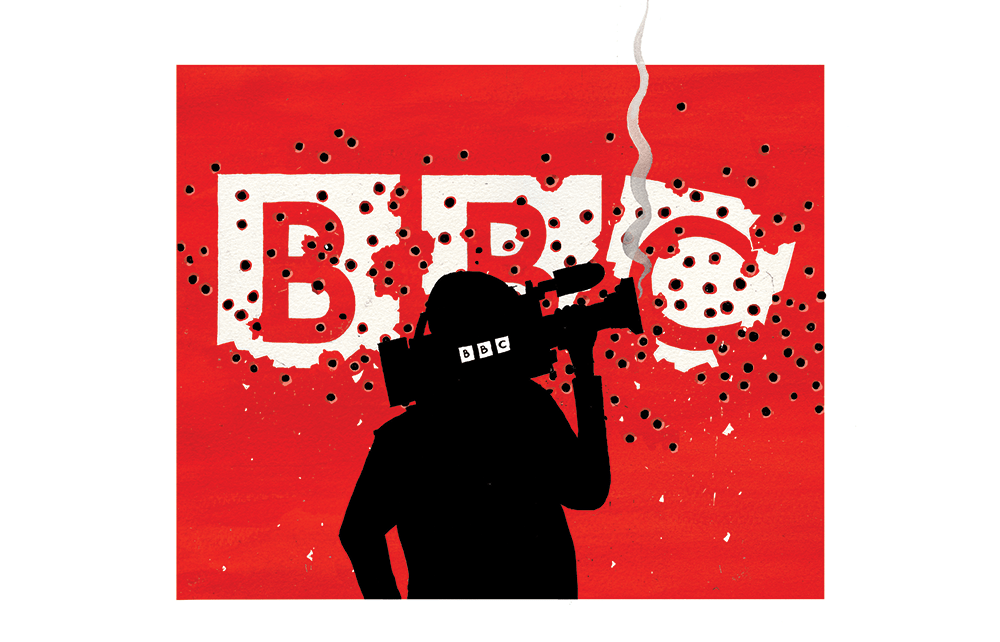Idon’t suppose it will surprise many Jewish people that BBC Verify – as staffed by people with ‘forensic investigative skills’ – used a rabid pro-Palestinian with links to Iran’s Islamic Revolutionary Guard Corps when adjudicating on an alleged Israeli attack against a Palestinian aid convoy in Gaza. Verify – a new unit which is, of course, pristine and even-handed – turned to a ‘journalist’ called Mahmoud Awadeyah for an unbiased description of exactly what happened to the convoy, unbothered by the fact that this is a man who danced a jig of joy when Israelis were killed in a rocket attack and warned them that there was more of the same stuff coming.
The BBC Verify unit is merely an expensive way of telling the public, ‘We are always right’
Awadeyah works for a news agency called Tasnim, a semi-official Iranian outlet owned fully by the Islamic Revolutionary Guard Corps. His social media posts suggest he wishes for Israel to be destroyed. The BBC, for its part, has rejected the complaints from people who suspect that ol’ Awadeyah may have a certain amount of skin in the game. It was a former director of BBC television, Danny Cohen, who raised the matter and suggested that Verify had become a tool for promoting anti-Israel bias. That’s the least of it, mate.
There are two strands to this whole business, the first being the existence of BBC Verify, unveiled last year by the corporation’s chief executive of news, Deborah Turness. This mini-marvel was to be dedicated to ‘radical transparency’ and employ 60 journalists trying to finding the real truth about what is happening in the world. This rather prompts the question of what the BBC’s 2,000 other journalists spend their time doing. Making up lies? Evading reality? Knitting? And here is the problem with Verify: the whole concept is philosophically flawed. You do not need to be Jacques Derrida to believe that in this complex world of ours it might not be possible for 60 hacks to arrive at incontestable truths on every issue that comes before them.

This reality-fact-checking-verify business has its roots in the Brexit debate, when the BBC – forced by law to be impartial in the run-up to our referendum – decided it needed a conduit to enable it to be considerably less so. And so the BBC Reality Check team was set up, headed by a chap called Chris Morris.
Claims from either side of the debate were subjected to scrutiny by the estimable Mr Morris who would later opine that by and large the Remainers were right. He ran into trouble during an on-air debate with Lord Lilley when the former Conservative minister pointed out, accurately enough, that Morris was no more rooted in reality than was he: Morris presented no new facts, merely argued the toss. In other words, it was two sides of an argument. Later Morris delivered himself of a radio show entitled Brexit: A Guide for the Perplexed. In series three, these dispassionate, unpartisan broadcasts used 24 main interviewees, of which 18 were speaking from a Remainer perspective, and only three were anti-EU. I commented at the time that it could not have been more biased if it had been presented by Peter Mandelson.
And now we have BBC Verify, a further exercise in the corporation’s justification of itself and demonstrably no more objective than the rest of its output. Logically, it could not be otherwise. Can you imagine a BBC report from Gaza immediately followed by a BBC Verify investigation which concluded that the whole thing was basically a Hamas press release? The entire unit is merely an expensive way of telling the public, ‘We are always right.’
The second issue is the nationality of the BBC correspondents covering the Gaza crisis. The BBC say they use Israeli correspondents but I’ve never seen one. There are several Palestinian journalists, including Rushdi Abualouf and Adnan El-Bursh, the latter of whom cried on air in a non-partisan manner when describing a supposed attack upon a hospital. Six journos from the BBC Arabic service were suspended when their somewhat gamey tweets regarding Jews and Israel came to light. The question, though, is why does the corporation employ so many foreign nationals to do its reporting?
This, too, goes back a while – to the first decade of the century. I remember some wokeish BBC exec suggesting that in future all its foreign correspondents should be, effectively, nationals of the country in which they were doing their reporting. By which the exec meant, primarily, black- or brown-skinned. There was a small furore when the statement got out and the BBC immediately denied it had plans for any such thing. And yet a quick look through the names of the correspondents in Africa, for example, or the Middle East, will suggest that this is exactly what they have done.
Which is why you may sometimes have difficulty making head or tail of what you are being told because the correspondent’s English isn’t terribly good, or their accent is too thick to be easily understood. Further, it will not be a dispassionate British view (for the British viewing public) that you are given, but an often highly impassioned view from a national.
I ought to point out that the BBC hasn’t extended this programme to correspondents in first-world countries, only to those which I dare say it believes live in colonially oppressed, developing nations. That is one explanation for why there is a whole bunch of Palestinians telling you what is going on. Given that this is the case, what a mercy it is we have BBC Verify around to clear up any misunderstandings.







Comments